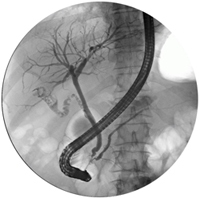ERCP

What is an ERCP?
ERCP (Endoscopic Retrograde Cholangio-Pancreatogram) is a technique of examining the small tubes (called ducts) that drain the liver, pancreas and gall bladder.
The aim of the procedure is to pass a small plastic tube into the ducts to inject radio-opaque dye and take x-rays. This plastic tube (cannula) is passed through the channel of a flexible tube called a Duodenoscope. The Duodenoscope allows full colour inspection of the duodenum and opening of the bile duct.
By performing ERCP your doctor can determine whether stones are present in the bile duct, and if so remove stones and relieve duct blockage by performing an endoscopic sphincterotomy.
Endoscopic sphincterotomy involves inserting a small surgical instrument into the opening of the bile duct where a cut is made to enlarge the opening, therefore allowing the stones to be extracted by the use of a balloon catheter.
The advantage of this procedure is that only one or two days of hospitalization are required and an open operation is avoided.
How are you prepared?
You are to fast for six (6) hours before the procedure (no food, no fluid, no smoking).
Heart and blood pressure medications should be taken at least three (3) hours before the procedure.
You will be given a sedative injection to help you relax for the procedure. You will be postioned on your stomach for the procedure.
Risks and Complications
The principle complication of ERCP is inflammation of the pancreas (Pancreatitis). This complication can occur in 1 out of every 20 patients and may require pain relief, which usually settles over the next 24-48 hours. Very rarely, however, pancreatitis can be more severe and need further treatment such as prolonged hospitalization and surgery.
In approximately 1 in 10 patients it is simply not possible to pass the plastic tube into the appropriate duct and therefore the ERCP cannot be performed.
Complications of Sphincterotomy can occur in 1 in 100 patients. These include haemorrhage, perforation, infection of the bile duct (Cholangitis) and incomplete removal of stones.
These complications are usually managed with intravenous infusions and other medication, but on occasion are severe enough to require open surgery.
PLEASE NOTE
- If you are not staying in hospital you must have a responsible adult with you to drive you home and stay with you for 12 hours following your procedure.
- Please bring clothing necessary for an overnight stay in hospital in case required.
- If you have serious heart or chest problems or drug allergies, special precautions need to be taken to reduce any risk. You should therefore inform the doctor of any serious conditions of this nature.
- If you a diabetic or taking Warfarin/Marevan please make sure nursing staff and the doctor are aware of this prior to the day of your procedure.
- This procedure involves taking x-rays and for this reason it is essential for female patients to advise staff if there is any possibility of pregnancy
